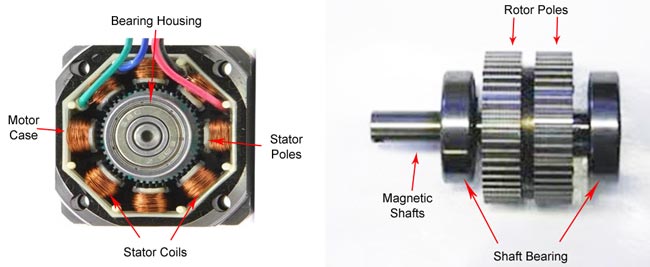Worrying about physical things can be strange for a gaggle of computer scientists. Our training and disposition is to be obsessed with the virtual–that which we can build up from raw bits to our own liking and rules. But when stepper motors make loud clicking, clanking sounds and don’t properly move, it takes no genius to know that poor engineering is present.
Stepper motors work by energizing certain “stator poles”” and thus rotating the “rotor poles”, and connected shaft, by force of magnetic attraction and repulsion. Here is an image of the insides of a stepper motor for reference.

Each opposite pair of stator poles is run by a separate DC power supply that, when all working in tandem, produce an accurate control of the shaft.
This sounds all well and good, especially for CS students, but the rotor poles magnetically snap into place when run and try to hold their position. Trying to run them quickly with the mechanical load of the print head led to the stepper motors sounding as though they were breaking and occasionally slipping, missing a step.
However, as each each stator pole is itself an inductive load, they can be PWMed for even finer control. This approach is known as “microstepping”, or stepping a fraction of a full step at a time. Not only does the allow for finer control of shaft’s position, but also runs the motors much smoother than trying to execute many full steps per second.
There is perhaps a more generally valuable lesson in this problem for the virtual-oriented: to remember that our virtual systems always have physical consequences. While more obvious when writing code to drive loud mechanical components like motors and solenoids, we would do well to remember our code always drives some silent processing unit. Every instruction run, virtual world hosted, or model trained is but the sleepless dream of a CPU, which at the least is consuming electricity and producing heat.
As much as we may feel our virtual creations are separate or running in tandem to the tangible world, they simply are not. Perhaps we should more concerned with the physical; it may be that is all that ultimately matters. Less poetically, it seems at least our due diligence to remember such consequences exist.